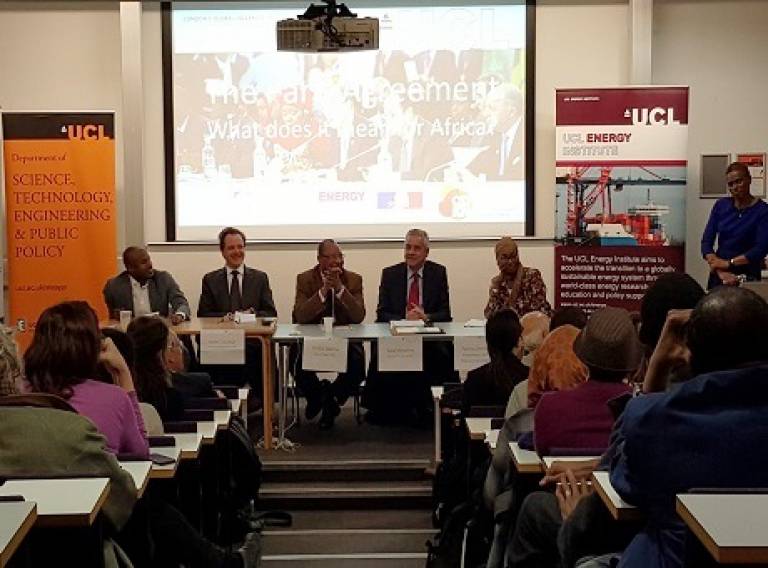“The Paris Agreement - What does it mean for Africa?” French Embassy and UCL-Energy discuss
24 March 2016

On March 23rd UCL-Energy held the second in the series of events organised jointly by UCL-Energy and the French Embassy, under the auspices of the long-established relationship between the French Embassy’s Science and Technology Department and UCL’s Grand Challenges programme. The event was organised by UCL’s Department of Science, Technology, Engineering and Public Policy (STEaPP) and UCL-Energy, in collaboration with the French Embassy and with support from the Climate Development Knowledge Network (CDKN).
This event titled "The Paris Agreement - What does it mean for Africa?" consisted of an all-day research collaboration workshop and an evening high-level panel discussion about the implications of the Paris Agreement for Africa and its development.
The research collaboration workshop was hosted at the French Embassy and attended by 30 participants who included researchers from African institutions, diaspora based in the UK, research partners from UCL along with other institutions and development partners from the UK and France. The workshop objectives were:
- To understand the Africa’s development aspirations
- To identify research gaps, needs and priorities (including capacity development) in the area of climate change and sustainable development and adaptation to climate change focusing on Africa.
- To develop an action plan for enhancing the quality of participation of African researchers in playing an effective role in the IPCC process.
At the evening event UCL-Energy’s senior research associate Dr Gabrial Anadarajah presented the workshop themes and discussions from the breakout groups.
The evening high-level panel members were Mr Seyni Nafo, Chairperson of the African Group of Climate Negotiators (AGN), Professor Youba Sokona, Vice-Chair of the Intergovernmental Panel on Climate Change (IPCC), Doctor Fatima Denton, Director of Special Initiatives Division (and Coordinator of the African Climate Policy Center), United Nations Economic Commission for Africa (UNECA) and Doctor Michel Colombier, Scientific Director of the Institute for Sustainable Development and International Relations (IDDRI). The event was moderated by Professor Ijeoma Uchegbu Pro-Vice Provost for Africa and The Middle East with open and closing remarks from UCL STEaPP Professor Yacob Mulugetta and UCL-Energy Director Bob Lowe.
The panel addressed questions such as: Does the Paris Agreement satisfy the African negotiations position? What are the implications for Africa of the science in the IPCC fifth assessment report? And, how can we move from political agreement to concrete action? And there was a special focus on the African Renewable Energy Initiative (AREI), nationally determined contributions, adaptation communications and how to improve African input to the upcoming IPCC sixth assessment report (AR6). The evening event was sold out with insightful questions from the audience and was followed by a reception for panellist, workshop attendees and audience members.
 Close
Close

